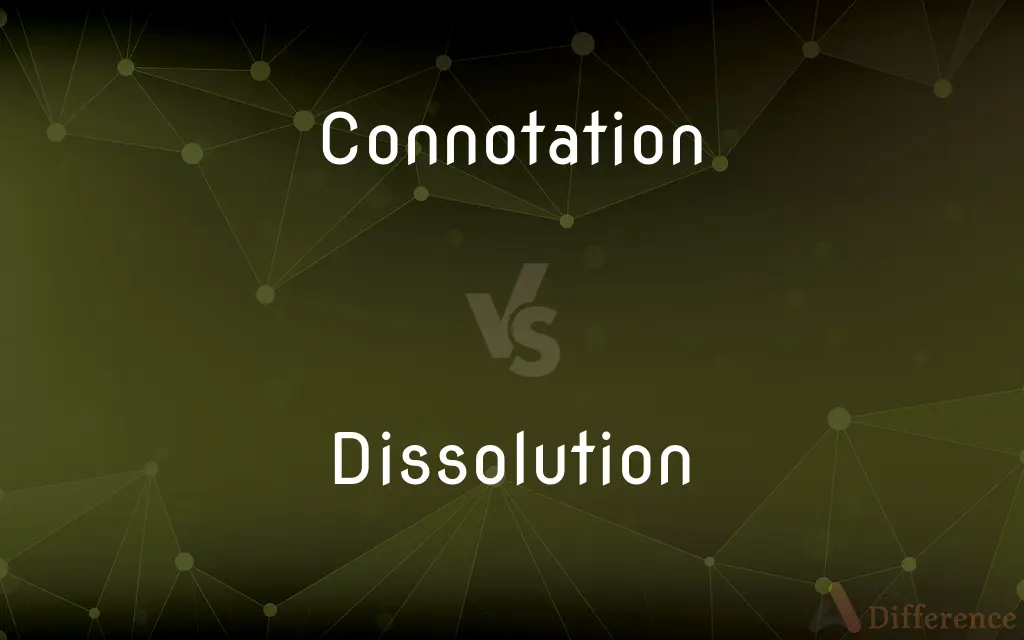Connotation vs. Dissolution — What's the Difference?
Edited by Tayyaba Rehman — By Fiza Rafique — Updated on April 26, 2024
Connotation involves the implied or emotional meaning of a word, while dissolution refers to the act of dissolving something, often legally or chemically.

Difference Between Connotation and Dissolution
Table of Contents
ADVERTISEMENT
Key Differences
Connotation captures the emotional or cultural associations attached to a word beyond its literal definition, whereas dissolution specifically refers to the process of a substance becoming incorporated into a liquid to form a solution or the ending of an organization or agreement.
Connotations can significantly influence interpretation and communication, imbuing words with positive or negative vibes; on the other hand, dissolution is a precise term, often used in legal, scientific, and business contexts to indicate the disintegration or termination of an entity.
While connotations are subjective and vary by culture and context, enhancing the richness of language, dissolution is a more objective term that usually follows defined criteria or processes, such as the dissolution of a corporation or a chemical solution.
Connotations play a crucial role in poetry and literature by adding layers of meaning, enhancing the depth and emotion of the text, whereas dissolution is critical in fields like chemistry and law, where it explains specific, measurable changes.
Connotations are essential for effective advertising and political rhetoric, where the implied meanings of words can influence public opinion and behavior; in contrast, dissolution processes are vital in scenarios like corporate restructuring or scientific experiments, where clarity and precision are paramount.
ADVERTISEMENT
Comparison Chart
Definition
Implied or emotional meaning of a word.
Act of dissolving something.
Usage in Language
Subjective and varies by context.
Objective and specific to context.
Common Contexts
Literature, rhetoric, advertising.
Chemistry, law, business.
Impact on Audience
Influences emotions and perceptions.
Indicates termination or chemical change.
Example
'Home' connotes warmth and security.
Salt undergoes dissolution in water.
Compare with Definitions
Connotation
A cultural implication of a word that goes beyond its direct meaning.
'Wall Street' connotes wealth and power.
Dissolution
The act of resolving or concluding an arrangement or agreement.
The dissolution of their marriage was finalized yesterday.
Connotation
An idea or feeling invoked by a word in addition to its primary meaning.
The word snake may connote deceit.
Dissolution
The process of a solid substance dissolving in a liquid.
Sugar undergoes dissolution in water.
Connotation
A secondary meaning enhancing the emotional depth of a word.
'Dove' connotes peace.
Dissolution
The breaking down of relationships or systems.
The dissolution of the empire was inevitable after the war.
Connotation
A layered meaning added to a word based on societal values.
'Youth' connotes vitality and inexperience.
Dissolution
A state of disintegration or decomposing.
The dissolution of the tablets occurs rapidly.
Connotation
The associative significance of a word as used in figurative language.
'Shark' connotes danger and ruthlessness in business.
Dissolution
The legal disbanding of an organization, such as a corporation.
The dissolution of the partnership was mutually agreed upon.
Connotation
A connotation is a commonly understood cultural or emotional association that any given word or phrase carries, in addition to its explicit or literal meaning, which is its denotation. A connotation is frequently described as either positive or negative, with regard to its pleasing or displeasing emotional connection.
Dissolution
The action of formally ending or dismissing an assembly, partnership, or official body
The Prime Minister asked the queen for a dissolution of Parliament
The dissolution of their marriage
Connotation
The act or process of connoting.
Dissolution
Debauched living; dissipation
An advanced state of dissolution
Connotation
An idea or meaning suggested by or associated with a word or thing
Hollywood holds connotations of romance and glittering success.
Dissolution
Decomposition into fragments or parts; disintegration.
Connotation
The set of associations implied by a word in addition to its literal meaning.
Dissolution
Indulgence in sensual pleasures; debauchery.
Connotation
(Logic) The set of attributes constituting the meaning of a term; intension.
Dissolution
Termination or extinction by disintegration or dispersion
The dissolution of the empire was remarkably swift.
Connotation
(semantics) A meaning of a word or phrase that is suggested or implied, as opposed to a denotation, or literal meaning. A characteristic of words or phrases, or of the contexts that words and phrases are used in.
The word "advisedly" has a connotation of "wisely", although it denotes merely "intentionally" and "deliberately."
The word "happy" has a positive connotation, while "sad" has a negative connotation.
Dissolution
Extinction of life; death.
Connotation
(logic) The attribute or aggregate of attributes connoted by a term, contrasted with denotation.
The two expressions "the morning star" and "the evening star" have different connotations but the same denotation (i.e. the planet Venus).
Dissolution
Annulment or termination of a formal or legal bond or relationship.
Connotation
The act of connoting; a making known or designating something additional; implication of something more than is asserted.
Dissolution
Formal dismissal of an assembly or legislature.
Connotation
A meaning implied but not explicitly denoted by some word or expression, which may be understood in addition to the explicit primary meaning.
Dissolution
Reduction to a liquid form; liquefaction.
Connotation
The full set of necessary properties possessed by all the objects within the extension of a term; the intensional meaning of a term, which determines the objects to which the term applies; the intension of a term.
Dissolution
The termination of an organized body or legislative assembly, especially a formal dismissal.
Connotation
What you must know in order to determine the reference of an expression
Dissolution
Disintegration, or decomposition into fragments.
Connotation
An idea that is implied or suggested
Dissolution
Dissolving, or going into solution.
Dissolution
The quality of being dissolute.
He led a life of dissolution, drinking and gambling almost daily.
Dissolution
The act of dissolving, sundering, or separating into component parts; separation.
Dissolutions of ancient amities.
Dissolution
Change from a solid to a fluid state; solution by heat or moisture; liquefaction; melting.
Dissolution
Change of form by chemical agency; decomposition; resolution.
The dissolution of the compound.
Dissolution
The dispersion of an assembly by terminating its sessions; the breaking up of a partnership.
Dissolution is the civil death of Parliament.
Dissolution
The extinction of life in the human body; separation of the soul from the body; death.
We expectedImmediate dissolution.
Dissolution
The state of being dissolved, or of undergoing liquefaction.
A man of continual dissolution and thaw.
Dissolution
The new product formed by dissolving a body; a solution.
Dissolution
Destruction of anything by the separation of its parts; ruin.
To make a present dissolution of the world.
Dissolution
Corruption of morals; dissipation; dissoluteness.
Dissolution
The process of going into solution;
The dissolving of salt in water
Dissolution
Separation into component parts
Dissolution
Dissolute indulgence in sensual pleasure
Dissolution
The termination of a meeting
Dissolution
The termination of a relationship
Common Curiosities
How does connotation affect communication?
Connotations influence how messages are perceived and interpreted by adding emotional or cultural nuances.
In what contexts is dissolution commonly used?
Dissolution is commonly used in legal, scientific, and business contexts.
Can the connotation of a word change over time?
Yes, connotations can change as cultural perceptions and language evolve.
What is the primary difference between connotation and dissolution?
Connotation refers to the implied meanings of words, while dissolution refers to the act of dissolving or ending something.
What is a real-world example of dissolution in chemistry?
A common example is salt dissolving in water to form a saline solution.
Why is understanding connotations important in advertising?
In advertising, understanding connotations can help shape positive perceptions and emotional responses to products.
What is necessary for a dissolution to occur in a chemical sense?
A solvent and a solute are necessary for chemical dissolution to occur.
How can connotations be misleading in communication?
If misunderstood, connotations can lead to misinterpretations of intent or meaning.
What legal process is referred to by dissolution?
In legal terms, dissolution often refers to the process of dissolving a marriage or business.
How does cultural context influence connotations?
Cultural context can dictate the positive or negative associations of certain words.
Share Your Discovery

Previous Comparison
Lure vs. Jig
Next Comparison
Sewer vs. DitchAuthor Spotlight
Written by
Fiza RafiqueFiza Rafique is a skilled content writer at AskDifference.com, where she meticulously refines and enhances written pieces. Drawing from her vast editorial expertise, Fiza ensures clarity, accuracy, and precision in every article. Passionate about language, she continually seeks to elevate the quality of content for readers worldwide.
Edited by
Tayyaba RehmanTayyaba Rehman is a distinguished writer, currently serving as a primary contributor to askdifference.com. As a researcher in semantics and etymology, Tayyaba's passion for the complexity of languages and their distinctions has found a perfect home on the platform. Tayyaba delves into the intricacies of language, distinguishing between commonly confused words and phrases, thereby providing clarity for readers worldwide.














































